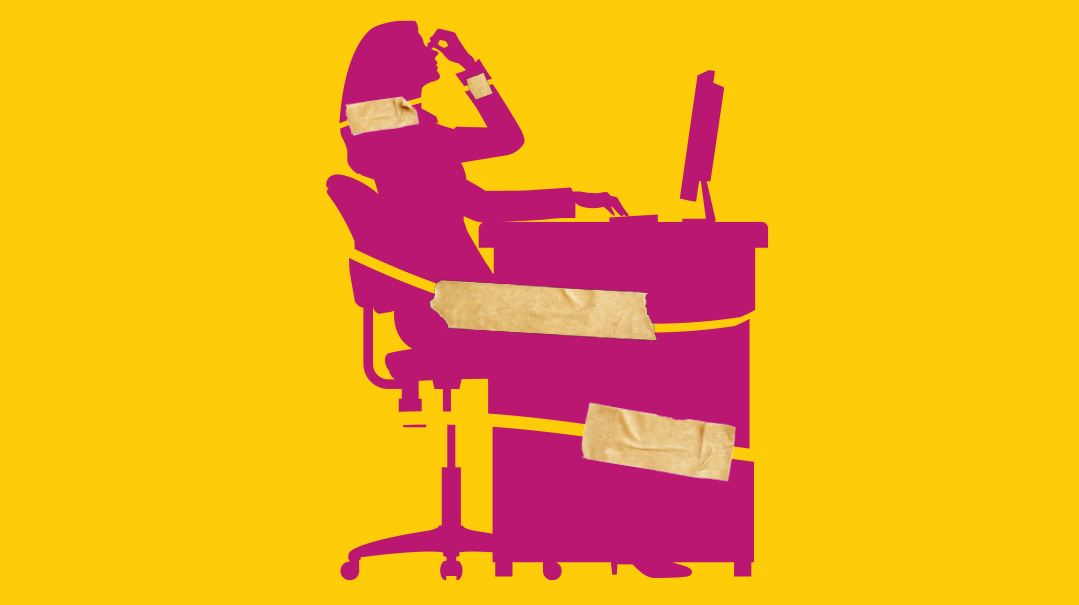This Doesn’t Work
| February 20, 2024For some women, there’s a pebble on the road to success: chronic and/or mental illness. Four women share their stories

Ayala’s Story
Slowing Down the Flow
It’s been 12 years since the birth of my youngest child, and I’ve been unwell since.
I don’t have an actual diagnosis, but I was sick with severe hyperemesis gravidarum (HG) in each of my four pregnancies, and my body never really recovered. During the last pregnancy, my doctor said he’d never seen such a difficult case as mine, and my children thought I was dying.
After I gave birth, I was very weak from malnutrition and wasn’t well enough to even think of going back to work until my baby was a year old. I then developed a benign tumor in my pituitary gland, which has hampered the ability of my digestive system to absorb nutrients properly. Since the beginning of my last pregnancy, I haven’t been able to eat well. I used to be a bit heavy; now I’m small and can’t gain weight.
The pituitary gland is a pea-size dgland at the base of the brain, but it has deceptively far-reaching effects on the body, like regulating metabolism, water levels, blood pressure and blood sugar, stimulating the thyroid, and bone and muscle maintenance. I can’t take any of these normal body functions for granted anymore — they can and have stopped working properly with little to no warning.
It’s no wonder I can no longer work full time.
For years I’d been a freelance graphic designer, and I had some steady clients. Business was growing, but I dreamed of landing a prestigious, well-paying job that would give me a steady salary and room to grow. This felt like a wistful dream. The opportunity came, though, and I received and accepted a dream job offer as the full-time art director at Tovim Meoros, a large nonprofit in my area.
And then I became pregnant with my fourth.
My husband came home from shul and saw me on the bathroom floor, too weak to crawl to bed. He called my boss to tell him I couldn’t show up. I couldn’t even remember my name. I really hoped the organization would understand and let me come back after the baby. But they couldn’t wait for me. They found a new person, and I was out of a job.
In the end, being out of a job was a good thing because since I gave birth, my life has been a journey punctuated by illness and several emergency surgeries.
There’s no way I can work full time in a steady job with my precarious medical situation. Instead, I’ve once again embraced the freelance life, which allows me to control my schedule and take on only as many projects as I can handle. I work with distant deadlines, scheduling projects to take four to six weeks. This way, even if I can’t work for a week or two, I can still come through in time. As I’ve seen that work-related stress causes my condition to flare up, sometimes I’ll need to take a week off from work — not to go on vacation, but to sit at home and eat a leisurely breakfast and do a crossword puzzle.
I’m careful not to overschedule, and if any symptoms return, I take a step back and push the project deadline off a bit. All of my contracts have a clause protecting me in case I can’t perform my responsibilities because of illness.
The first time I had to tell a client that I wouldn’t meet my deadline, I felt terrible writing the email from my hospital bed. Most of the time my clients understand and wish me refuah sheleimah, but twice I’ve had to transfer projects to trusted colleagues because the deadline couldn’t be pushed off.
I do have some loyal clients. One client who’s been using my services for years once told me that he tried a different designer to create materials for his booth in a trade show because he was nervous I wouldn’t come through on time. Her design was okay, he said, but he still felt he liked my work better and has come back for my work many times since.
I’m a type-A perfectionist, and it’s been hard to scale back my ambitions. I wanted to gain a name in my field and earn really nicely, enough to buy a nice Jerusalem apartment. I’m working through grief over that all the time. And while I’m nowhere near the fulfillment of my erstwhile dreams, the work I do feels good, in its own small way. The emails and calls I get from happy clients, the rush of adrenaline from each lead sent my way, make me feel I’m doing something meaningful.
And I’ve seen that Hashem sends us exactly the amount of money He feels we need. Letting go and letting Hashem be in charge of our parnassah has been challenging, but it also strengthened my spiritual muscles. I’ve learned that my business must reflect the season of life I’m in. Every time I start to feel like I have a handle on my life and can invest more in my business, my medical situation takes a major downturn. So I started saying, “Hashem, I get it. This is my path in life, and I can’t push myself further.”
Mindy’s Story
I Don’t Know the Plan
I
suffer from an eating disorder and anxiety. When I returned from seminary, I was afraid to go into the working world, I felt like I couldn’t put myself out there the way my friends did, so I pretended I couldn’t figure out what to do, got busy researching options, applying to jobs I didn’t even want to take, and running off to the library for hours on end.
The ruse lasted until Covid.
It was lockdown. I stayed in bed. Millions of people around the world were stuck at home, so nothing looked wrong with me. I found a couple of courses in space planning and business, and everyone thought I was busy with that. But once Succos came around, I began to worry. I wasn’t getting anything done and couldn’t handle my own existence.
One morning I couldn’t get out of bed.
My mother thought I was sick and tried making an appointment at the doctor. But I told her I couldn’t get out even for that. I needed help sorting out my life, fast.
We called Relief and found a therapist. For more than a year, I attended therapy religiously until I felt ready to take a job.
I became a secretary and then a full-time space planner at a local design firm, where I still work now.
My boss is chilled — as long as I get the work done, he doesn’t mind if I leave early. So I come into the office most days, and when I feel I can’t stay anymore, I leave as soon as I can.
Last Shavuos my eating disorder flared up, and I was hospitalized for two weeks. Everyone in my office heard I wasn’t feeling well. No one knew what was really going on, and I wanted it to be this way.
I try to just stick to a routine — get up, get dressed, do what I need to do at work, then come home and crash. Crashing means sitting at home for hours, mindlessly playing with the buttons on my phone or staring at the walls, waiting for the anxious feelings to pass.
But that’s not really taking care of the problem, and I know it. I know I need therapy but am too afraid to start.
My job needs a lot of creativity (sometimes I wish it was brainless). I love coming up with solutions for clients. Most of them purchase small homes in crowded neighborhoods and need to make the spaces work for their families. I help them make meaningful living space out of each nook and cranny. My boss loves my work and always tries to get me to take on more clients, more projects.
But success gets my cortisol levels to spike. My subconscious mind knows that once my work is really good, I’m going to have to put myself out there and grow my career. So instead of gaining confidence from each happy client, I wonder inside if the great job I did was a fluke, and wonder if I’ll ever be able to do it again. My brain plays scenes of me suddenly going blank, and suddenly I’m shaking and stuttering.
I’d love to do better work, and more of it.
Raizy’s Story
Uncomfortable Decisions
T
he summer before 12th grade, I went to camp for the full summer. At some point during the summer, I was sick from food poisoning but didn’t take it seriously, so it went untreated. When I came back home, I couldn’t ignore it anymore.
It was c. diff, an excruciatingly painful stomach bacteria usually transmitted in a hospital setting. The doctors gave me the strongest antibiotics they had, but it took four rounds for the c. diff to go away.
The infection was gone, but I still felt terrible pain.
I went for a colonoscopy. The diagnosis? Ulcerative colitis, an inflammatory disease of the lower digestive tract.
Nobody in school knew the extent of my pain with bodily functions they all took for granted. Slowly, I adapted to the new reality and came to a new, more painful but still manageable, normal. I went to seminary with no significant incident, came back, and got a job.
I was the front-desk receptionist in a lighting showroom, the first salesperson people saw walking in. And I was okay, managing my symptoms and following my doctor’s instructions to keep it under control.
And then, a year into my job, I had a flare-up.
Suddenly I was running to the bathroom before I even finished a sentence to my coworkers. I ran to the bathroom between customers.
No one at work understood what was going on.
I lived on high alert.
After a while, I felt I couldn’t do my job properly anymore and left. After that, I worked part-time directing activities for a special-needs organization. I left after a few months and worked as a tutor in several schools. For a full year, I worked only when it worked for me, giving my body time to regain its strength and heal.
I was well enough to enter shidduchim, and I knew what I needed: someone with the emotional depth to understand what it’s like to live with a chronic illness and not think less of me for it.
After my year without a steady job, I found medications that worked for me. I got engaged to my wonderful husband, who’s completely supportive and goes hiking and biking with me when I’m feeling good.
After getting married, I took a part-time job with flexible hours as a secretary. I stayed at that job for two years and then moved to a new job.
Now I’m finally in remission. I have more energy than I’ve had in a long time. I have two children, and I work full-time managing hundreds of employees. There was no way I could have done that eight years ago, when my condition was active.
I still tutor students at night a bit, but my day job is fulfilling and exciting.
Now that my colitis is under control, I’m okay sharing about my condition with my coworkers. They know that every eight weeks, I leave work early to get a medication IV at home. But it’s manageable. I know what I need to do to keep my condition under control. I’m successful at work and feel fulfilled at home.
Gitty’s Story
A Roller Coaster Ride
MY
first pregnancy and postpartum period were typical — not easy, but manageable. Then, after a two-and-a-half-year gap, came my second daughter.
After she was born, I couldn’t catch my tail. Totally normal, everyone said. You’re learning to juggle two kids, and it’s hard to learn. But I didn’t feel like I was learning.
My daughter was six months old, and I’d wake up each morning, see unfolded laundry, dishes in the sink, or a dirty highchair tray — and hyperventilate. Every little household task frightened me, and I couldn’t imagine how I’d get it done.
It was strange. I had plenty of time to recover in between my kids, and I was working part-time from home as a sheitelmacher, so why wasn’t I managing?
I loved my job, loved making women look and feel beautiful, and I loved the flexibility of the job in which I made my own schedule. But because I was my own boss, when I felt low, it was easy to stop working by just telling people I wasn’t available. If they pushed me to find a time that worked, I’d change my mind a few times until finally finding a time that I was willing to commit to.
Seeing people, talking, feeling productive made me feel like a mensch. The work really saved me.
I was doing my friend’s sheitel before her sister’s wedding, and she noticed something was off about me. She helped me recognize my symptoms as a postpartum anxiety disorder because she was in treatment for it herself.
Identifying my symptoms was a game changer.
I spoke to my doctor, and she prescribed medication to help me keep unhelpful thoughts under control. My friend helped me find a therapist who specializes in postpartum mood disorders. In therapy, I learned to identify my triggers and some practical tools and skills for coping with my anxiety.
I knew about postpartum depression, new mothers feeling sad and having a hard time getting out of bed, but I had no idea how common postpartum anxiety is, and what it looks like in real life.
Eventually, the medication and therapy helped. I pulled my life together and also slowed down. I still took clients when I could, but I gave myself more grace when I was down. My emotions were okay. My life was manageable.
I even weaned off my medication and managed instead with the occasional therapy session.
And then I got pregnant with my third.
The pregnancy was so difficult to manage. Instead of feeling anxious, I was more depressed than I’d ever been before. I tried going back to therapy, but felt so low it didn’t help me. No skills and techniques could help me get out of the deep pit I was in. I had to start medication again.
I held on by my fingertips and couldn’t be more excited to deliver that baby. He was my first boy. Holding him in the delivery room, I squeezed his tiny fingers and told him how much trouble he’d caused the past while.
The crisis had past, and once I recovered from the birth, I felt better again.
I’m trying to get back into the sheitel business, but it’s been slow. We’ve bought a house in a new neighborhood, and I have to develop a new clientele. After all I’ve been through, I’m not in a rush. I’m letting Hashem show me how much work I’m up to each day.
How to Stay the Course
A talk with Chaya Lieba Kobernick, PsyD
I strongly promote staying the course for my clients who struggle with mental illness.
What this means:
If you have a job, stay with it. If you get off your regular trajectory because of mental illness, you’ll promote more illness rather than recovery. You might need to adjust — that’s okay. But drastic change is usually not recommended.
Sometimes I work with more severe, less common illnesses like schizophrenia or bipolar — in those cases, drastic change is necessary more often.
The majority of my clients with borderline personality disorder do well working in special education or a preschool. They thrive with the empathy and incredible amount of patience that these jobs require and will become those teachers who go above and beyond what’s expected from them.
If you know you’re on the autism spectrum, don’t get a job that requires you to get along with people! An office position can play to your strengths.
In general, keeping up with a job you’re good at will only work to your advantage.
What’s Valid and What’s Not
Sometimes we try so hard to accommodate and validate people with mental health struggles that we end up accommodating and validating the invalid.
If your relative is depressed and doesn’t want to get out of bed, don’t let her get away with it by finding her an afternoon job. This kind of accommodation keeps her stuck in her illness. And the same goes if you’re a talented fiction writer who’s so afraid of rejection that you won’t send your writing to a publisher. Working your life around the problem just validates the invalid. But don’t just let your feelings rise within you ® balance the non-accommodation with taking care of yourself so you’ll learn to tolerate more.
What Self-care Means:
I focus on two parts of self-care.
Building a life worth living sets you up for long-term success. Think about the life you want, and spend your energy every day on something that’s not mental illness.
Reduce vulnerability — Look out for your ABC MISHAPS. (DBT officially calls it ABC PLEASE, but I found some skills missing, so I changed it to MISHAPS.)
A – Accumulate positives in short-term and long-term
Set yourself up to intentionally have positive experiences every day, like making it to the beach in time for sunset or meeting someone who brightens your day.
B – Build mastery
Do things that give you a sense of accomplishment. Learn how to do something you always wanted to do (play piano or speak Spanish?) so you’ll get a sense of accomplishment.
C – Cope ahead
Try to foresee stressful situations and set yourself up for success in dealing with the issues. Decide how you’d like to handle them in advance so you’ll end up handling them well.
M – Mindful movement
Give your body some movement that feels good.
I – Intuitive eating
Try to eat in a way that respects your body.
S – Sleep
Get a balanced amount of sleep that feels good for you.
H – Hormones
This isn’t addressed by standard DBT, but I’ve seen how important it is. Respect your hormonal changes, whether you’re having lower energy levels at different points of your cycle or during pregnancy and postpartum. Learn to accept that you’ll have more or less energy at different times. And whenever you’re introducing different hormones into your system, look out for how they’re changing your well-being. Chances are that hormones will affect you.
A – Alone
Being lonely will affect how you feel.
P – Physical illness
Illness makes you vulnerable to emotional weakness.
S – Substances
Alcohol, caffeine, or large amounts of sugar will affect the way you feel.
My take on flare-ups
I call them lapses, not relapses. Lapses are inevitable because the old learning ® slipping into our places of weakness ® never goes away. And when we’re under high stress, it’s likely to turn back up.
Look at a lapse as a way to collect new data. If you’ve done good work, you’ll have a full cadre of tools to use during a lapse, so instead of thinking, “Help, this is a disaster,” you can say, “Oh, this is interesting.”
(Originally featured in Family First, Issue 882)
Oops! We could not locate your form.







